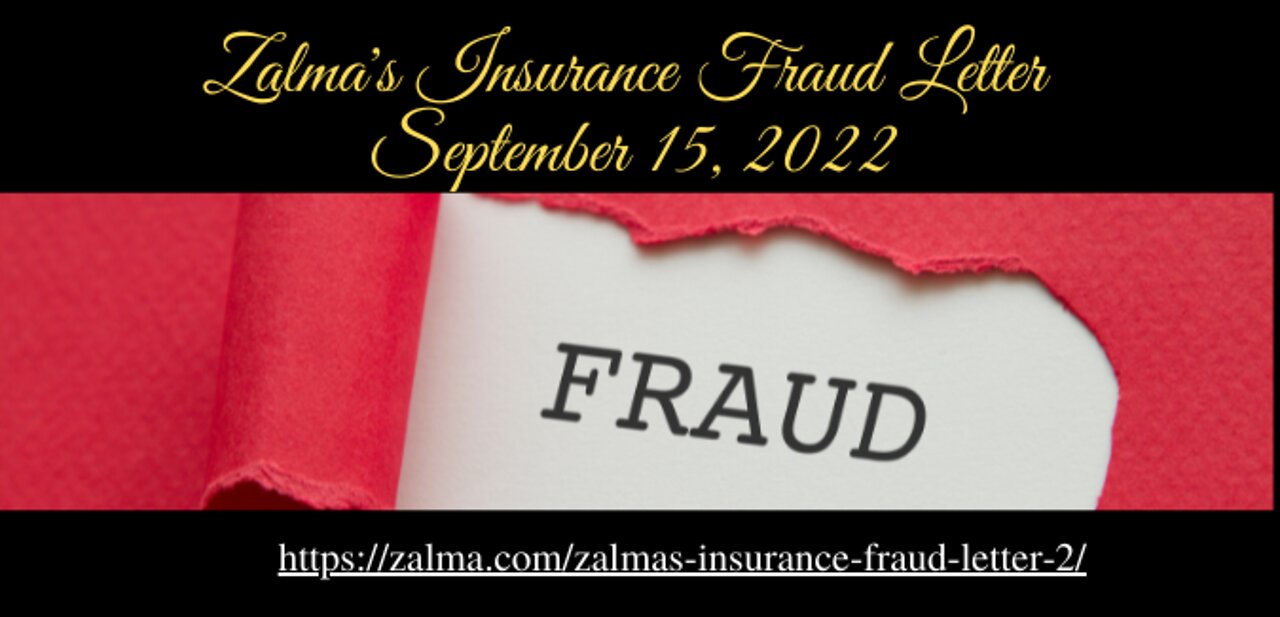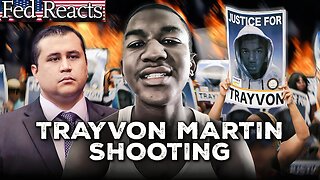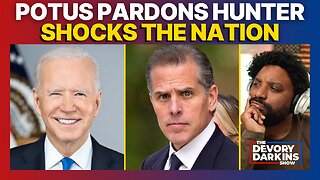Premium Only Content

Zalma's Insurance Fraud Letter September 15, 2022
ZIFL Vol 26 Number 18
Read the full Adobe pdf version at http://zalma.com/blog/wp-content/uploads/2022/09/ZIFL-09-15-2022-1.pdf
Conviction Affirmed for Multiple Counts and One Reversed
Small Victory but Stay in Jail
The appellate court modified the judgment, as a matter of discretion in the interest of justice, by vacating the conviction of insurance fraud in the third degree under count 57 of the indictment and the sentence imposed thereon and dismissing that count of the indictment; as so modified, the judgment is affirmed.
The defendant waived his claim that one count of insurance fraud in the third degree with respect to a certain insurance policy issued by GMAC Insurance, of which he was convicted, was barred by the statute of limitations by not making a timely, written motion to dismiss on that ground.
In The People of the State of New York v. Jean M. Davilmar, also known as Jean Myrtho Davilmar, No. 2018-05468, Ind. No. 4334/16, 2022 NY Slip Op 04975, Supreme Court of New York, Second Department (August 17, 2022) the defendant Jean M. Davilmar appealed from a judgment of the trial court convicting him of larceny in the third degree (2 counts), scheme to defraud in the first degree, insurance fraud in the third degree (17 counts), criminal possession of a forged instrument in the second degree (5 counts), and offering a false instrument for filing in the first degree (4 counts), after a nonjury trial, and imposing sentence.
The defendant only partially preserved for appellate review his challenge to the legal sufficiency of the evidence supporting his convictions of grand larceny in the third degree (2 counts), insurance fraud in the third degree (16 counts), and scheme to defraud in the first degree (see CPL 470.05[2]. In any event, viewing the evidence in the light most favorable to the prosecution the appellate court found that it was legally sufficient to establish the defendant’s guilt of grand larceny in the third degree beyond a reasonable doubt (Penal Law §§ 155.05[1], [2][a], [b]; 155.35[1]. Likewise, the evidence was legally sufficient to establish the defendant’s guilt of insurance fraud in the third degree beyond a reasonable doubt (Penal Law § 176.20. Moreover, the evidence was legally sufficient to establish the defendant’s guilt of scheme to defraud in the first degree. Further, in fulfilling the court’s responsibility to conduct an independent review of the weight of the evidence it was satisfied that the verdict of guilt on each of those counts was not against the weight of the evidence.
The sentence imposed was not excessive. The defendant’s remaining contentions were found to be without merit.
Wisdom
“Age is not a particularly interesting subject. Anyone can get old. All you have to do is live long enough.” — Groucho Marx
“What do automobiles, guns, and home-schooling all have in common that makes the liberals hate them? All these things reduce individual dependence on the government and on the grandiose schemes for other people’s lives created by liberals and imposed by government.” —Thomas Sowell
“Better a good enemy than a bad friend.” — Jewish saying
“The transformation of charity into legal entitlement has produced donors without love and recipients without gratitude.” – Antonin Scalia
“I do not think that we should be over-anxious. We can make sense of the future if we understand the lessons of the past.”- Elizabeth II
“The art of living lies less in eliminating our troubles than in growing with them.” — Bernard M. Baruch
“The unions might be good for the people who are in the unions, but it doesn’t do a thing for the people who are unemployed. Because the union keeps down the number of jobs, it doesn’t do a thing for them.” — Milton Friedman
“Things turn out best for the people who make the best of the way things turn out.”— John Wooden
“Semicolons only prove that the author has been to college.” – E. B. White
“Sometimes in this life, under the stress of an exceptional emotion, people do say what they think.” – Marcel Proust
“If our country, when pressed with wrongs at the point of the bayonet, had been governed by its heads instead of its hearts, where should we have been now? Hanging on a gallows as high as Haman’s. —Thomas Jefferson
“Those who know do not speak. Those who speak do not know.” — Tao Te Ching
“Ultimately a genuine leader is not a searcher for consensus but a molder of consensus.” — Martin Luther King Jr.
“We must always take sides. Neutrality helps the oppressor, never the victim. Silence encourages the tormentor, never the tormented.” — Elie Wiesel
“Keep away from people who try to belittle your ambitions. Small people always do that, but the really great make you feel that you, too, can become great.” — Mark Twain
“Of those men who have overturned the liberties of republics, the greatest number have begun their career by paying an obsequious court to the people, commencing demagogues and ending tyrants.” —Alexander Hamilton
The Coalition Against Insurance Fraud’s Calculation of Insurance Fraud in the U.S.
The Coalition Against Insurance Fraud’s Report Came up With the Following Conclusions:
Final Estimate Of The Cost Of Insurance Fraud In The United States:
All numbers are in billions and figures are as of 2022:
Property & Casualty $45B
Workers’ Compensation $34
Premium Avoidance $35.1B
Healthcare $36.3B
Medicare and Medicaid Fraud $68.7B
Life $74.7B
Disability $7.4B
Auto Theft $7.4B
The report, when dealing with property and casualty insurance reveals that in 220 the industry collected $728.69 billion dollar in premium. If only 10% of that premium was paid to fraudsters – a fairly reasonable estimate used by the Insurance Information Institute (III) – they would receive $72.87 billion. The numbers should change enormously if the calculation follows the Insurance Research Council estimate that casualty fraud accounted for between 15% and 17% of total claims payments for auto insurance. A 15% calculation could result in $109.30 Billion and 17% the fraudsters would take $123.88 Billion.
It’s good to see that the Coalition took into consideration inflation and the obvious growth of fraud since the institution of the tort of bad faith. In my opinion, however, they underestimated the true extent of fraud since the insurance industry has no admissible evidence about the true amount because most insurance fraud attempts succeed. As you read below about convictions for the crimes of insurance fraud, note how long the schemes went on before they were caught and recognize that those caught were amateurs who were so sloppy the seemed to beg the state and federal agencies to arrest them.
The report also includes auto theft in the analysis of the updated estimate of the cost of insurance fraud in the United States. At the current time, auto thefts in the United States are reported to be on the rise. These thefts directly impact insurers through increased claims, investigations of the theft, and policy payments where appropriate. Auto thefts also harm consumers. Obviously, those directly impacted are harmed but so too are all consumers who pay for auto theft crimes through higher premiums. Absent provable involvement of the insured in the theft, however, auto theft is not insurance fraud but an insurance crime for which virtually all automobile insurance policies extend coverage. The Coalition recognizes the extensive and excellent work being done by our partner, the National Insurance Crime Bureau, law enforcement agencies and others to fight back on the crime of automobile thefts. We include the information in this report, and the cost in our estimate of insurance fraud cost in the United States to assist those efforts and shed additional light on the problem of automobile thefts in our nation.
You can read the full report here.
You can also read about the extent of Workers’ Compensation Fraud here.
-
 8:57
8:57
Barry Zalma, Inc. on Insurance Law
10 months agoNo Coverage for Benefits no Right to Bad Faith Damages
167 -
 35:29
35:29
BonginoReport
4 hours agoBiden Pardons Crackhead Son Who Sold Out America (Ep.95) - 12/02/24
27.4K62 -
 4:04:32
4:04:32
DoomGnome
12 hours agoMornings with DoomGnome: The Long Dark Pt. 6 Astrid Goes Hiking...
2.14K4 -
 DVR
DVR
Chicks On The Right
4 hours agoMock's Back! Plus Kash Patel Tapped For FBI, DOGE Ready To Make Cuts, & More Liberal Lunacy
7.76K1 -

RG_GerkClan
2 hours agoLIVE in 1440p: New Week, New Domination - Gray Zone Warfare - Gerk Clan
8.1K -
 1:46:40
1:46:40
Man in America
1 day ago🔴 LIVE: Is Trump Using Israel to CRUSH the CCP and BRICS Alliance?
76K134 -
 DVR
DVR
Fragniac
6 hours ago☀️ XDEFIANT for Breakfast 🍳☕️ Happy #MGGA Day❗ #RUMBLEGAMING #RUMBLETAKEOVER
4.75K1 -
 LIVE
LIVE
Jeff Ahern
1 hour agoMonday Madness with Jeff Ahern (Joe Pardons a Turkey)
189 watching -
 3:11:03
3:11:03
Fed Reacts
11 hours agoFed Explains Trayvon Martin Shooting & Zodiac Killer FINAL Episode!
138K68 -
 15:58
15:58
DeVory Darkins
11 hours ago $29.52 earnedJoe Biden Pardons His Son Hunter and What is Means for January 6th
72.8K103